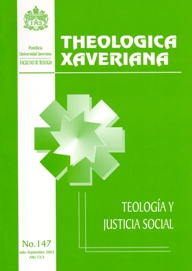Résumé
Los temas de la justicia y el Reino de los Cielos son
fundamentales para el Jesús de Mateo; ellos son la síntesis de
su predicación e impregnan cada uno de sus sermones y
actuaciones. Jesús viene a enseñar el camino que conduce al
Padre; predica la forma como han de comprenderse las
Escrituras, es decir, la ley y los profetas; resignifica la ley y
renueva la alianza. Él es el protagonista del cumplimiento de las promesas; es el nuevo Moisés que entrega, en el monte, los
nuevos mandatos al nuevo pueblo de Dios para que viva la
nueva justicia, y sella la nueva alianza. Las Bienaventuranzas
constituyen el exordio de esta Buena Nueva; son la
introducción, no sólo al discurso evangélico, sino a toda la
enseñanza del Maestro. Las Bienaventuranzas son la palabra de
felicidad para quienes hacen la voluntad de Dios, son la palabra
de esperanza para quienes tienen fe en el Padre, la palabra de vida que enseña la justicia como camino para heredar el Reino de los Cielos. A continuación se presenta el análisis literario del texto de las Bienaventuranzas en el Evangelio de Mateo.
Esta revista científica se encuentra registrada bajo la licencia Creative Commons Reconocimiento 4.0 Internacional. Por lo tanto, esta obra se puede reproducir, distribuir y comunicar públicamente en formato digital, siempre que se reconozca el nombre de los autores y a la Pontificia Universidad Javeriana. Se permite citar, adaptar, transformar, autoarchivar, republicar y crear a partir del material, para cualquier finalidad (incluso comercial), siempre que se reconozca adecuadamente la autoría, se proporcione un enlace a la obra original y se indique si se han realizado cambios. La Pontificia Universidad Javeriana no retiene los derechos sobre las obras publicadas y los contenidos son responsabilidad exclusiva de los autores, quienes conservan sus derechos morales, intelectuales, de privacidad y publicidad.
El aval sobre la intervención de la obra (revisión, corrección de estilo, traducción, diagramación) y su posterior divulgación se otorga mediante una licencia de uso y no a través de una cesión de derechos, lo que representa que la revista y la Pontificia Universidad Javeriana se eximen de cualquier responsabilidad que se pueda derivar de una mala práctica ética por parte de los autores. En consecuencia de la protección brindada por la licencia de uso, la revista no se encuentra en la obligación de publicar retractaciones o modificar la información ya publicada, a no ser que la errata surja del proceso de gestión editorial. La publicación de contenidos en esta revista no representa regalías para los contribuyentes.


